Daily Vocabulary Words: List of Daily Used Words
Hi there. Welcome to this special section @ Wordpandit.
Our endeavour here is straightforward: highlighting important daily vocabulary words, you would encounter in The Hindu. This is your repository of commonly used words; essentially, we are posting a list of daily used words. Hence, this has significant practical application as it teaches you words that are commonly used in a leading publication such as The Hindu.
Visit the website daily to learn words from The Hindu.
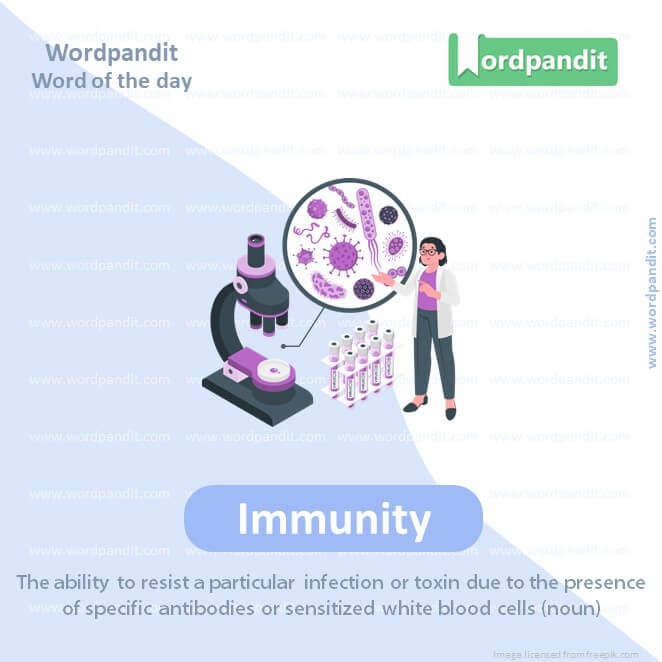
WORD-1: Immunity
CONTEXT: Article 361 of the Constitution provides only a limited and conditional immunity for the Governors.
SOURCE: The Hindu
EXPLANATORY PARAGRAPH: Immunity is like having a special shield that stops you from getting sick. When you have immunity, it means your body knows how to fight off germs and keep you healthy.
MEANING: The ability to resist a particular infection or toxin due to the presence of specific antibodies or sensitized white blood cells (noun).
PRONUNCIATION: ih-myoo-nih-tee
SYNONYMS: Protection, Resistance, Safeguard, Shield, Defense, Exemption
USAGE EXAMPLES:
1. After getting her vaccine, she had immunity against the flu.
2. The immunity of children to some diseases increases as they grow up.
3. He claimed diplomatic immunity to avoid prosecution.
4. The vaccine provides lifelong immunity to the virus.
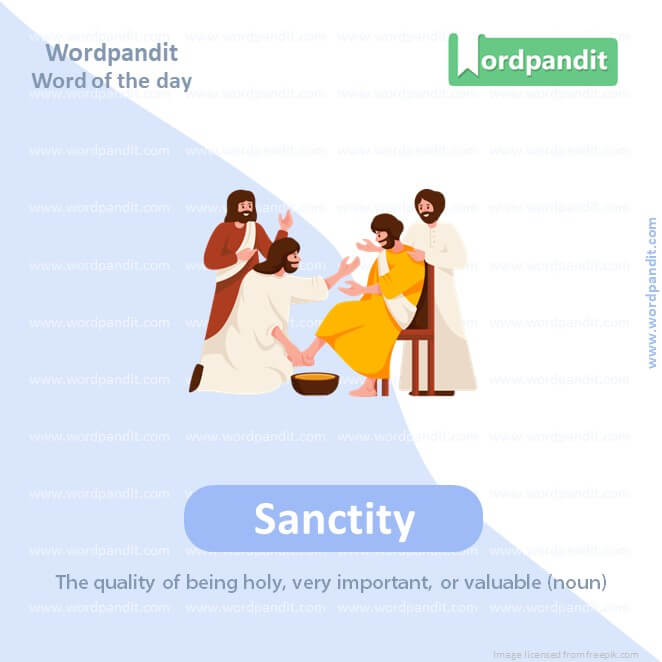
WORD-2: Sanctity
CONTEXT: However, the Court said that “right persons” should be chosen as Governors for maintaining “the sanctity of the post”.
SOURCE: The Hindu
EXPLANATORY PARAGRAPH: Sanctity is like thinking something is very, very special and important. It’s like treating something with a lot of respect because it’s so special.
MEANING: The quality of being holy, very important, or valuable (noun).
PRONUNCIATION: sangk-tih-tee
SYNONYMS: Holiness, Sacredness, Purity, Divinity, Reverence, Piety
USAGE EXAMPLES:
1. They believed in the sanctity of marriage.
2. The sanctity of the temple was respected by all.
3. She spoke about the sanctity of nature.
4. The law upheld the sanctity of human life.
WORD-3: Disparaging
CONTEXT: Questions relating to disparaging comments by public functionaries came up for consideration before the Supreme Court in Kaushal Kishor v. State of Uttar Pradesh (2023).
SOURCE: The Hindu
EXPLANATORY PARAGRAPH: Disparaging is when you say something that is not nice about someone or something. It’s like being mean with your words and making someone or something seem not important or good.
MEANING: Expressing the opinion that something is of little worth; derogatory (adjective).
PRONUNCIATION: dih-spar-uh-jing
SYNONYMS: Belittling, Derogatory, Disrespectful, Scornful, Disdainful, Depreciative
USAGE EXAMPLES:
1. His disparaging remarks about his teammates were not appreciated.
2. She made a disparaging comment about the quality of the food.
3. The article was criticized for its disparaging tone.
4. He often used disparaging language when angry.
WORD-4: Consideration
CONTEXT: Questions relating to disparaging comments by public functionaries came up for consideration before the Supreme Court in Kaushal Kishor v. State of Uttar Pradesh (2023).
SOURCE: The Hindu
EXPLANATORY PARAGRAPH: Consideration is thinking about other people’s feelings or needs. It’s like being kind and caring about how others feel or what they need.
MEANING: Careful thought, typically over a period of time; or the fact of taking into account someone or something (noun).
PRONUNCIATION: kuhn-sid-uh-ray-shun
SYNONYMS: Thoughtfulness, Deliberation, Regard, Respect, Attention, Concern
USAGE EXAMPLES:
1. He showed great consideration for her feelings.
2. Taking all things into consideration, we decided to move.
3. The project requires careful consideration.
4. She thanked them for their consideration.
WORD-5: Curtailed
CONTEXT: The Court said that the freedom of expression of public functionaries could not be curtailed other than by way of the “reasonable restrictions”, as permitted by Article 19(2) of the Constitution.
SOURCE: The Hindu
EXPLANATORY PARAGRAPH: Curtailed is like when something is made shorter or reduced. It’s like when playtime is cut short because it’s time to go inside.
MEANING: Reduce in extent or quantity; impose a restriction on (verb).
PRONUNCIATION: kur-tayld
SYNONYMS: Reduced, Shortened, Cut back, Truncated, Limited, Diminished
USAGE EXAMPLES:
1. The company curtailed its spending.
2. Their vacation was curtailed due to bad weather.
3. Budget cuts curtailed the project’s scope.
4. The new law curtailed their freedom.
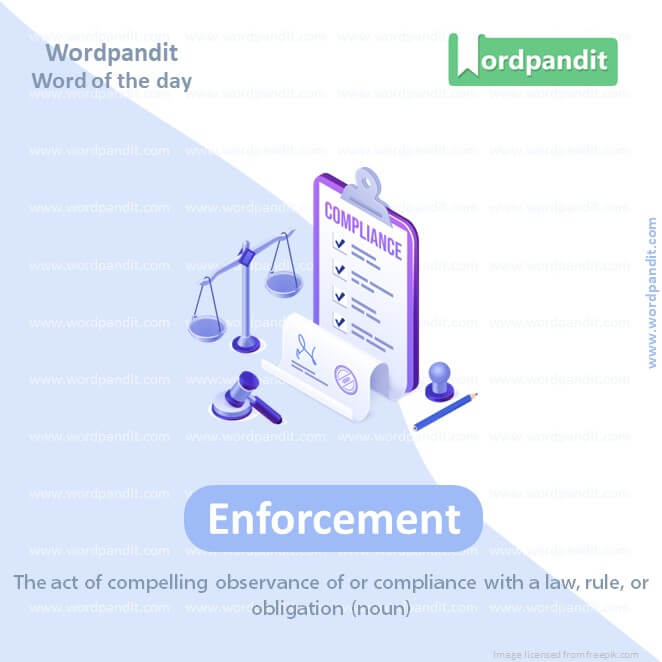
WORD-6: Enforcement
CONTEXT: While the majority opinion varied from Justice Nagarathna’s view on the method of enforcement of fundamental rights against non-state actors, the personal liability of public functionaries on matters unconnected with their public duty was not a topic of disagreement.
SOURCE: The Hindu
EXPLANATORY PARAGRAPH: Enforcement is like making sure that rules or laws are followed. It’s like when teachers make sure everyone in class follows the class rules.
MEANING: The act of compelling observance of or compliance with a law, rule, or obligation (noun).
PRONUNCIATION: en-forss-muhnt
SYNONYMS: Implementation, Execution, Administration, Application, Operation, Upholding
USAGE EXAMPLES:
1. The enforcement of the new law begins next week.
2. There was a need for stricter enforcement of regulations.
3. The police are responsible for the enforcement of the law.
4. Effective enforcement ensures safety in the community.
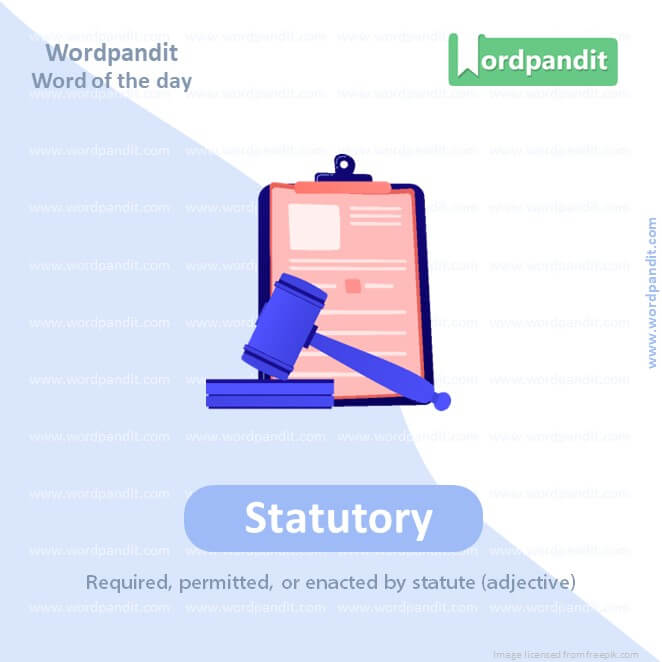
WORD-7: Statutory
CONTEXT: To illustrate, if a crime is committed by a public functionary, there is no statutory or constitutional immunity for them. Offences such as defamation could be committed by a public functionary as well, when the act is unconnected with or is in apparent conflict with their official duty.
SOURCE: The Hindu
EXPLANATORY PARAGRAPH: Statutory is like when something is decided by a law or rule that everyone must follow. It’s like how there are rules in a game that everyone agrees to play by.
MEANING: Required, permitted, or enacted by statute (adjective).
PRONUNCIATION: stat-yoo-tor-ee
SYNONYMS: Legal, Lawful, Authorized, Official, Prescribed, Regulated
USAGE EXAMPLES:
1. They made a statutory declaration of their assets.
2. The company is under a statutory obligation to provide accurate information.
3. Statutory holidays are recognized by law.
4. The statutory age for retirement is 65.
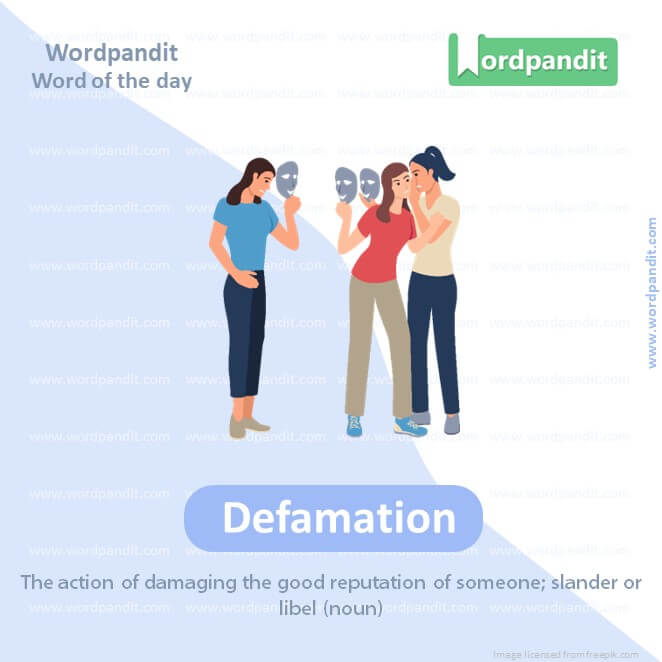
WORD-8: Defamation
CONTEXT: Offences such as defamation could be committed by a public functionary as well, when the act is unconnected with or is in apparent conflict with their official duty.
SOURCE: The Hindu
EXPLANATORY PARAGRAPH: Defamation is when someone says something untrue and bad about another person, which can hurt their reputation. It’s like spreading a mean rumor that isn’t true.
MEANING: The action of damaging the good reputation of someone; slander or libel (noun).
PRONUNCIATION: def-uh-may-shun
SYNONYMS: Slander, Libel, Calumny, Vilification, Smear, Disparagement
USAGE EXAMPLES:
1. The article was considered to be a defamation of his character.
2. She sued the newspaper for defamation.
3. Spreading lies about someone is a form of defamation.
4. The celebrity faced defamation on social media.
WORD-9: Apparent
CONTEXT: Offences such as defamation could be committed by a public functionary as well, when the act is unconnected with or is in apparent conflict with their official duty.
SOURCE: The Hindu
EXPLANATORY PARAGRAPH: Apparent is when something seems a certain way or looks like it is that way, but it might not be. It’s like when something looks like candy, but it’s actually a toy.
MEANING: Clearly visible or understood; obvious (adjective).
PRONUNCIATION: uh-par-uhnt
SYNONYMS: Evident, Obvious, Clear, Plain, Visible, Manifest
USAGE EXAMPLES:
1. It was apparent that she was unhappy.
2. The reason for the delay was not immediately apparent.
3. His disappointment was apparent to everyone.
4. The solution became apparent after much discussion.
WORD-10: Conflict
CONTEXT: Offences such as defamation could be committed by a public functionary as well, when the act is unconnected with or is in apparent conflict with their official duty.
SOURCE: The Hindu
EXPLANATORY PARAGRAPH: Conflict is when two people or groups disagree or fight about something. It’s like when two kids argue about which game to play.
MEANING: A serious disagreement or argument, typically a protracted one (noun); or be incompatible or at variance; clash (verb).
PRONUNCIATION: kon-flikt
SYNONYMS: Dispute, Clash, Struggle, Confrontation, Battle, Discord
USAGE EXAMPLES:
1. The conflict between the two teams was intense.
2. They were trying to resolve a conflict at work.
3. His opinions were in conflict with mine.
4. The siblings often conflict over trivial matters.
Vocabulary Difficult Words
In our journey of language learning, an encounter with ‘vocabulary difficult words’ is inevitable. These seemingly intimidating terms can often seem like stumbling blocks. However, they also offer a unique chance to deepen our understanding and competence in the language. With a strategic approach, learning ‘vocabulary difficult words’ can become less daunting and more of an empowering undertaking.
To befriend ‘vocabulary difficult words’, comprehension is key. Familiarize yourself with the meaning, usage, and context of these words. Utilize different resources such as books, documentaries, online articles, and digital content. This contextual exposure can ease the process of understanding ‘vocabulary difficult words’.
Challenging as they may seem, ‘vocabulary difficult words’ can be tamed with appropriate memory tactics. Use of flashcards or digital language learning apps that support active recall and spaced repetition can be effective. To foster deeper connections with ‘vocabulary difficult words’, employ mnemonic techniques. This cognitive strategy, involving association of new information to known concepts or stories, aids in better retention and recall.
Another essential in mastering ‘vocabulary difficult words’ is practice. Be it in conversations, written communications, or social media interactions, endeavor to incorporate these words. Practice not only reinforces your knowledge but also enhances your confidence in using these words.
In conclusion, navigating the terrain of ‘vocabulary difficult words’ involves a confluence of comprehension, memory tactics, and active practice. These strategies, interwoven, help transform intimidating words into familiar friends. By conquering ‘vocabulary difficult words’, you not only augment your vocabulary but also elevate your language skills. Remember, every challenging word unlocked is yet another ornament in your linguistic archive. So, delve deep into the ‘vocabulary difficult words’, and uncover the treasures they hold.













